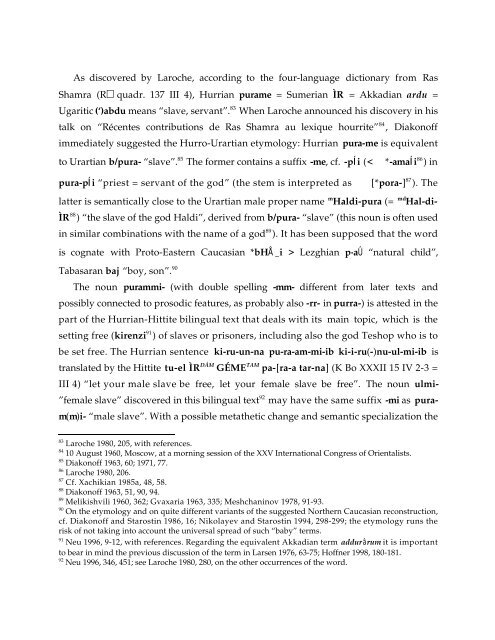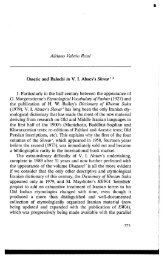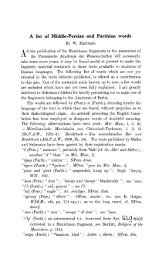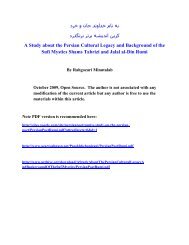Comparative Notes on Hurro-Urartian, Northern Caucasian
Comparative Notes on Hurro-Urartian, Northern Caucasian
Comparative Notes on Hurro-Urartian, Northern Caucasian
Create successful ePaper yourself
Turn your PDF publications into a flip-book with our unique Google optimized e-Paper software.
As discovered by Laroche, according to the four-language dicti<strong>on</strong>ary from Ras<br />
Shamra (R quadr. 137 III 4), Hurrian purame = Sumerian ÌR = Akkadian ardu =<br />
Ugaritic (‘)abdu means “slave, servant”. 83 When Laroche announced his discovery in his<br />
talk <strong>on</strong> “Récentes c<strong>on</strong>tributi<strong>on</strong>s de Ras Shamra au lexique hourrite” 84 , Diak<strong>on</strong>off<br />
immediately suggested the <strong>Hurro</strong>-<strong>Urartian</strong> etymology: Hurrian pura-me is equivalent<br />
to <strong>Urartian</strong> b/pura- “slave”. 85 The former c<strong>on</strong>tains a suffix -me, cf. -pÍi (< *-amaÍi 86 ) in<br />
pura-pÍi “priest = servant of the god” (the stem is interpreted as [*pora-] 87 ). The<br />
latter is semantically close to the <strong>Urartian</strong> male proper name m Haldi-pura (= md Hal-di-<br />
ÌR 88 ) “the slave of the god Haldi”, derived from b/pura- “slave” (this noun is often used<br />
in similar combinati<strong>on</strong>s with the name of a god 89 ). It has been supposed that the word<br />
is cognate with Proto-Eastern <strong>Caucasian</strong> *bHÅ i > Lezghian p·aÛ “natural child”,<br />
Tabasaran baj “boy, s<strong>on</strong>”. 90<br />
The noun purammi- (with double spelling -mm- different from later texts and<br />
possibly c<strong>on</strong>nected to prosodic features, as probably also -rr- in purra-) is attested in the<br />
part of the Hurrian-Hittite bilingual text that deals with its main topic, which is the<br />
setting free (kirenzi 91 ) of slaves or pris<strong>on</strong>ers, including also the god Teshop who is to<br />
be set free. The Hurrian sentence ki-ru-un-na pu-ra-am-mi-ib ki-i-ru(-)nu-ul-mi-ib is<br />
translated by the Hittite tu-el ÌR DÁM GÉME TAM pa-[ra-a tar-na] (K Bo XXXII 15 IV 2-3 =<br />
III 4) “let your male slave be free, let your female slave be free”. The noun ulmi-<br />
”female slave” discovered in this bilingual text 92 may have the same suffix -mi as pura-<br />
m(m)i- “male slave”. With a possible metathetic change and semantic specializati<strong>on</strong> the<br />
83 Laroche 1980, 205, with references.<br />
84 10 August 1960, Moscow, at a morning sessi<strong>on</strong> of the XXV Internati<strong>on</strong>al C<strong>on</strong>gress of Orientalists.<br />
85 Diak<strong>on</strong>off 1963, 60; 1971, 77.<br />
86 Laroche 1980, 206.<br />
87 Cf. Xachikian 1985a, 48, 58.<br />
88 Diak<strong>on</strong>off 1963, 51, 90, 94.<br />
89 Melikishvili 1960, 362; Gvaxaria 1963, 335; Meshchaninov 1978, 91-93.<br />
90 On the etymology and <strong>on</strong> quite different variants of the suggested <strong>Northern</strong> <strong>Caucasian</strong> rec<strong>on</strong>structi<strong>on</strong>,<br />
cf. Diak<strong>on</strong>off and Starostin 1986, 16; Nikolayev and Starostin 1994, 298-299; the etymology runs the<br />
risk of not taking into account the universal spread of such “baby” terms.<br />
91 Neu 1996, 9-12, with references. Regarding the equivalent Akkadian term addurârum it is important<br />
to bear in mind the previous discussi<strong>on</strong> of the term in Larsen 1976, 63-75; Hoffner 1998, 180-181.<br />
92 Neu 1996, 346, 451; see Laroche 1980, 280, <strong>on</strong> the other occurrences of the word.





